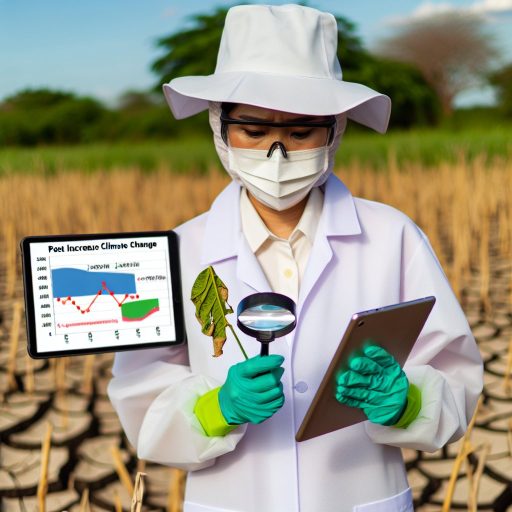Introduction:
A plant pathologist plays a crucial role in identifying, preventing, and managing diseases that affect plants.
Their work is essential in maintaining the health and productivity of crops in agriculture.
This blog post aims to offer a detailed look into a day in the life of a plant pathologist.
Morning Routine:
Plant pathologists typically start their day by inspecting plant samples collected from fields or greenhouses.
They use various techniques such as microscopy and DNA analysis to identify pathogens causing diseases.
Fieldwork and Research:
After analyzing samples, plant pathologists may visit farms to assess disease outbreaks.
They provide recommendations for control measures and conduct research to develop disease-resistant crop varieties.
Laboratory Work:
Back in the lab, plant pathologists spend time analyzing data, writing reports, and collaborating with other scientists.
They may also attend meetings to discuss research findings and plan future projects.
Training and Education:
Plant pathologists often participate in workshops, conferences, and training programs to stay updated on the latest developments in their field.
They also mentor students and interns interested in plant pathology.
Networking and Collaboration:
Throughout the day, plant pathologists interact with farmers, agronomists, extension agents, and other professionals in the agricultural industry.
Collaboration is essential for effective disease management and prevention.
Continuing Education:
At the end of the day, plant pathologists may review scientific journals, attend webinars, or work on publications.
Continuous learning is key to success in this dynamic field.
Plant pathologists play a vital role in safeguarding the health of plants and ensuring food security.
Their work is challenging yet rewarding, as they contribute to sustainable agriculture and environmental conservation.
Morning Routine:
- Wake up time
- Breakfast and coffee
- Reviewing schedule for the day
My day as a plant pathologist typically starts early in the morning.
I usually wake up around 6:00 AM to get a head start on my day.
After hitting the snooze button a few times, I finally roll out of bed and start my morning routine.
Transform Your Career Today
Unlock a personalized career strategy that drives real results. Get tailored advice and a roadmap designed just for you.
Start NowFirst things first, I stumble into the kitchen to make myself a hearty breakfast.
A balanced meal gives me the energy I need to tackle the day ahead.
As I eat, I sip on a steaming cup of coffee to wake myself up and kickstart my brain.
While enjoying my breakfast and coffee, I take the time to review my schedule for the day.
I glance over my calendar, checking for any important meetings, field visits, or research tasks that need my attention.
This helps me mentally prepare for the day ahead and ensures that I don’t forget any important details.
Once I finish my breakfast and coffee, I grab my bag, double-check that I have all the tools and equipment I need, and head out the door to start my day as a plant pathologist.
The morning routine sets the tone for a productive and successful day ahead.
Fieldwork
One of the most exciting aspects of being a plant pathologist is conducting fieldwork.
Visiting farms or fields to assess plant health is a crucial part of the job.
Being out in the field allows us to see plant diseases up close and personal.
- Collecting samples for analysis is an essential part of our fieldwork routine.
- We carefully choose specimens that exhibit symptoms of various plant diseases.
- These samples are then brought back to the lab for further examination.
Interacting with farmers during fieldwork is both rewarding and informative.
Discussing plant issues with farmers helps us understand the challenges they face.
It also allows us to provide valuable insights and recommendations for disease management.
Building relationships with farmers is key to successful plant disease prevention and control.
You Might Also Like: Salary and Job Outlook for Pest Control Advisors
Laboratory Work:
As a plant pathologist, a significant part of my work revolves around laboratory analysis to identify diseases affecting plants.
In this section, I will walk you through the processes involved in our laboratory work.
When samples arrive at the lab, the first step is to examine them under microscopes.
Showcase Your Business Today
Reach thousands of readers actively exploring professional services. Publish your business profile and grow your audience now.
Publish NowThis allows us to observe any visible symptoms such as lesions, discoloration, or unusual growth patterns.
By closely inspecting the plant tissues, we can determine if there are any signs of disease present.
Following visual examination, we conduct a series of tests to identify the specific pathogens responsible for the observed symptoms.
This may involve culturing the pathogens on agar plates, performing PCR tests, or using immunological techniques to detect antigens.
These tests help us pinpoint the exact cause of the plant disease.
Once we have gathered all the necessary data, we meticulously record our findings and organize them into comprehensive reports.
These reports detail the type of pathogen identified, the symptoms it causes, and recommendations for disease management.
Our goal is to provide accurate and actionable information to help farmers protect their crops.
In addition to identifying pathogens, we also study their behavior and develop strategies to control and prevent their spread.
This involves testing the efficacy of different fungicides or biocontrol agents to determine the most effective treatment options.
Our research in the lab plays a crucial role in developing sustainable solutions for managing plant diseases.
Laboratory work is an essential component of a plant pathologist’s daily routine.
It requires precision, attention to detail, and a deep understanding of plant-pathogen interactions.
By combining our expertise with advanced laboratory techniques, we can make significant contributions to the field of plant pathology.
This work helps safeguard global food security.
- Analyzing samples under microscopes
- Conducting tests to identify pathogens
- Recording findings and creating reports
Gain More Insights: Precision Agriculture and Government Regulations
Meetings and Consultations:
- Meeting with team members to discuss findings.
- Consulting with other plant pathologists on complex cases.
- Providing recommendations to farmers on disease management.
As a plant pathologist, one of the essential aspects of my job is conducting meetings and consultations with various stakeholders.
These meetings are crucial for sharing findings, seeking advice, and providing recommendations for disease management.
Meeting with Team Members:
I start my day by meeting with my team members to discuss the latest findings from our research and fieldwork.
This collaboration helps us stay updated on the current trends in plant diseases and brainstorm potential solutions.
Consulting with Other Plant Pathologists:
There are times when we encounter complex cases that require the expertise of other plant pathologists.
I regularly consult with my colleagues in the field to gain new insights, perspectives, and approaches to tackle challenging diseases.
Providing Recommendations to Farmers:
A significant part of my job involves working directly with farmers to help them manage and control plant diseases effectively.
I provide recommendations based on our research findings, tailored to their specific needs and challenges.
In these meetings and consultations, effective communication, collaboration, and knowledge sharing are key to providing comprehensive solutions to farmers and advancing the field of plant pathology.
Discover More: Success Stories of Agricultural Marketing Specialists
Research and Continuing Education:
Plant pathologists are constantly engaged in research and continuing education to stay updated with the latest advancements in their field.
This involves:
-
Reading Scientific Articles and Research Papers:
Plant pathologists spend a significant amount of time reading scientific articles and research papers to keep abreast of the current trends and developments in plant pathology.
This helps them to stay informed about new diseases, pathogens, and control measures.
-
Attending Conferences and Workshops:
Another important aspect of a plant pathologist’s professional life is attending conferences and workshops.
These events provide opportunities to network with other experts in the field, learn about cutting-edge research,
and exchange ideas and best practices. Conferences and workshops also enable plant pathologists to present their own research findings and receive feedback from peers.
-
Staying Updated on the Latest Advancements in Plant Pathology:
Plant pathology is a rapidly evolving field with new discoveries and technologies emerging constantly.
To stay competitive and provide the best possible services to farmers, plant pathologists must stay updated on the latest advancements in plant pathology.
This includes staying informed about new diagnostic tools, disease management strategies, and emerging pathogens.
By staying updated on these advancements, plant pathologists can enhance their expertise and deliver innovative solutions to tackle plant diseases effectively.
Research and continuing education are crucial components of a plant pathologist’s daily life, helping them to stay at the forefront of their field and make meaningful contributions to plant health and agriculture.
See Related Content: Technology in the Agricultural Loan Industry

Administrative Tasks:
Managing emails and correspondence: As a plant pathologist, a significant part of my day involves staying on top of emails from colleagues, clients, and collaborators.
I need to respond promptly to inquiries, schedule meetings, and communicate important updates.
Updating databases and records: Keeping accurate and up-to-date records is crucial in plant pathology.
I regularly input data on plant diseases, treatments, and outcomes into our database.
This helps track trends, identify patterns, and make informed decisions.
Planning future projects and field visits: Another essential aspect of my role is planning for future projects and field visits.
This involves coordinating with team members, scheduling site visits, and researching potential opportunities for collaboration.
It is important to stay organized and proactive in planning to ensure successful outcomes.
Training and Mentorship:
As a plant pathologist, one of the most crucial aspects of my job is providing training and mentorship to budding professionals in the field.
This involves working closely with interns and junior plant pathologists to help them develop their skills and expertise.
Showcase Your Business Today
Reach thousands of readers actively exploring professional services. Publish your business profile and grow your audience now.
Publish NowI take great pride in mentoring these aspiring plant pathologists, as I understand the importance of passing on knowledge and experience to the next generation.
By providing guidance and support, I hope to inspire them to excel in their careers and make valuable contributions to the field.
In addition to one-on-one mentoring, I also conduct workshops and training sessions to share my expertise with a wider audience.
These sessions cover a range of topics, from the latest research developments to practical techniques for diagnosing and treating plant diseases.
Furthermore, I actively engage with my colleagues in the plant pathology community, sharing insights and knowledge through collaboration and networking.
By exchanging ideas and experiences, we can all benefit from each other’s expertise and contribute to advances in the field.
Overall, training and mentorship are integral parts of my role as a plant pathologist.
By investing time and effort in developing the skills and knowledge of others, I hope to nurture a new generation of plant pathologists who are passionate, knowledgeable, and skilled in their work.
Daily Responsibilities of a Plant Pathologist
A typical day in the life of a plant pathologist involves conducting field surveys.
They collect samples for analysis and gather data on plant health.
Data analysis plays a vital role in identifying plant diseases.
Collaboration with farmers and researchers is essential for effective disease management.
Plant pathologists ensure food security by managing diseases that threaten crops.
Their expertise helps prevent outbreaks and sustain agricultural productivity.
If you have a passion for plants and problem-solving, this career is rewarding.
The demand for plant pathologists is growing due to climate change and food security challenges.
By pursuing this career, you contribute to feeding the world.
Your work helps protect crops and safeguard our food supply for future generations.
Additional Resources
Insect Festival of Arkansas | Entomology and Plant Pathology …
Plant pathologists honored by American Phytopathological Society …
[E-Books for Sale]
The Big Book of 500 High-Paying Jobs in America: Unlock Your Earning Potential
$19.99 • 500 High-Paying Jobs • 330 pages
Explore 500 high-paying jobs in America and learn how to boost your career, earn more, and achieve success!
See All 500 High-Paying Jobs of this E-Book
1001 Professions Without a Degree: High-Paying American Jobs You Can Start Now
$19.99 • 1001 Professions Without a Degree • 174 pages
Discover 1001 high-paying jobs without a degree! Unlock career tips, skills, and success strategies for just $19.99!




